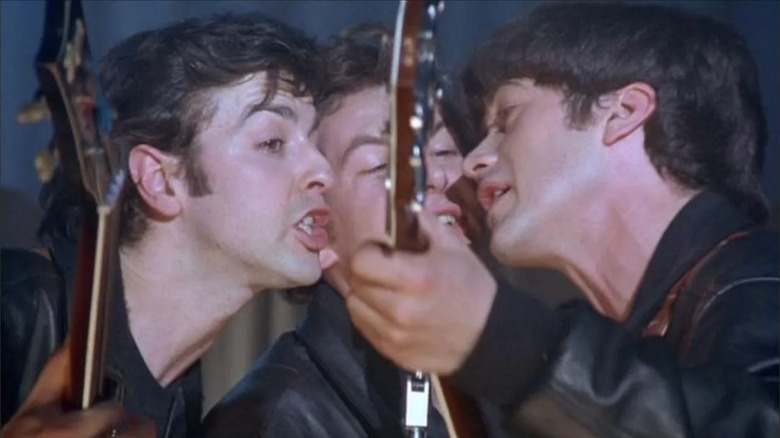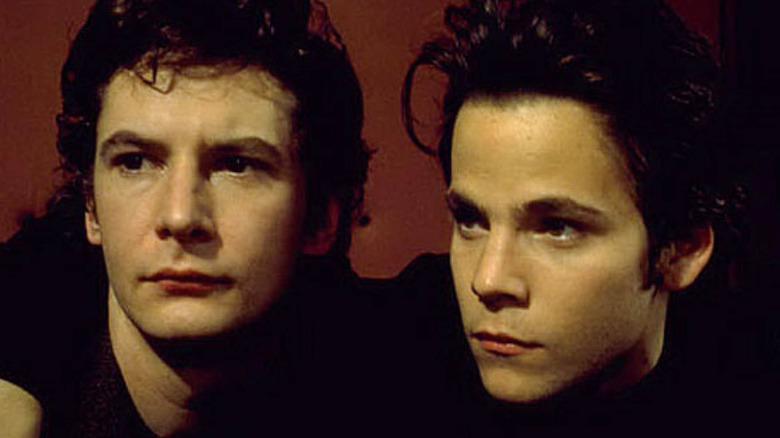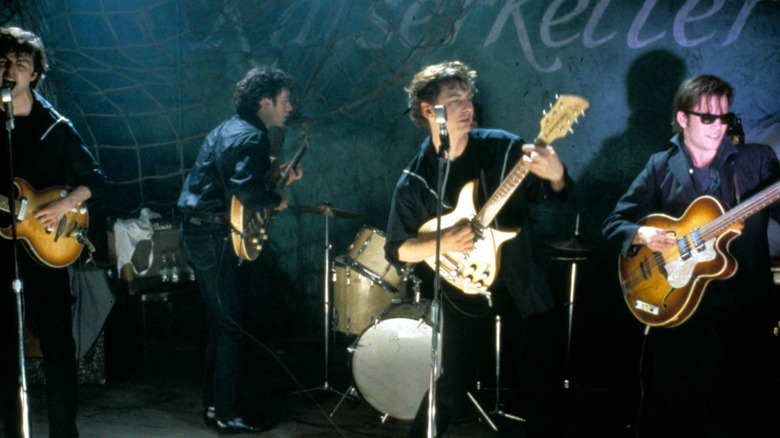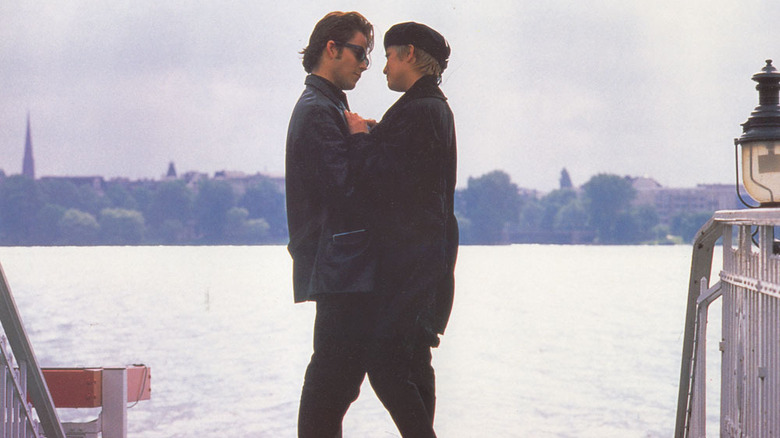Prepare For Those Beatles Movies With A Long-Forgotten (But Really Good) Box Office Failure
Pop music phenoms come and go, fall in and out of favor and sometimes fade into total obscurity. Very few remain relevant a decade removed from their initial success, and you can count on maybe two hands the number of artists who can knock out a new song or reissue and top the Billboard charts 50-plus years after their debut.
And then there's The Beatles.
From the moment they scored their first number one hit in the U.K. with 1963's "From Me to You," The Beatles drew on their multitude of musical influences — blues, country, rockabilly, and the sui generis soul sounds pulsating out of Motown — to create perfectly constructed, infectiously catchy singles that earwormed their way into the fabric of your being. Within three years of breaking big in the U.S., they released the pioneering folk-rock LP "Rubber Soul," flirted with psychedelia and raga on the expansive "Revolver," and permanently altered a generation's consciousness with the gateway aural hallucinogen that is "Sgt. Pepper's Lonely Hearts Club Band."
And when they broke up in 1970, they left us wanting more yet, somehow, leaving us with more than enough.
The Beatles' music is ageless, and their fan base continues to be an all-ages deal — and it is due to this enduring, ever-growing popularity that filmmakers keep mining their music and their story for box office gold. Oddly, this has rarely worked out. The most memorable movies inspired by The Beatles tend to be pretty terrible and/or flops. Michael Schultz's "Sgt. Pepper's Lonely Hearts Club Band," Jessie Nelson's "I Am Sam," Danny Boyle's "Yesterday..." if you're not wincing, then you haven't seen them. At least Julie Taymor's "Across the Universe" has a cult following.
Sam Mendes is hoping to buck this trend with his ambitious plan to make individual movies about each member of the Fab Four. While we're waiting to see how those pan out, now would be an opportune time to revisit a little-seen, semi-forgotten 1990s banger about The Fifth Beatle.
The ballad of the fifth beatle
According to the members of the band, there was no official "Fifth Beatle." The idea of a bonus Beatle was invented by radio DJ Murray the K, who bestowed the title on himself for his ceaseless promotion of the band during their first visit to the U.S. According to Paul McCartney, only band manager Brian Epstein and producer George Martin were worthy of the appellation. George Harrison's picks for the honor were PR man Derek Taylor and Apple Corps. executive Neil Aspinall. Other candidates include the band's first drummer, Pete Best, and keyboardist Billy Preston, who might've become a full-time member had they stuck it out past "Abbey Road."
The sentimental favorite, however, has to be Stuart Sutcliffe. And Iain Softley's 1994 biopic, "Backbeat," makes an invigorating case for his role in The Beatles' rise from upstart bar band to rock-and-roll sensation. While Sutcliffe was an undeniably gifted artist, his skills were most pronounced visually. According to Sutcliffe's mentor, pop art pioneer Eduardo Paolozzi, the young man evinced exceptional promise as a abstract expressionist painter. As the bassist for the earliest incarnation of The Beatles, well, opinions vary.
Softley's film deals with Sutcliffe's conflicted feelings about sticking with the band and his best mates (he was especially close to John Lennon) and doing what feels right by diving headlong into the art world (at the encouragement of his girlfriend Astrid Kirchherr). We've seen variations on this story before, but rarely with such a charged backdrop. Sutcliffe can't see the future, but we can. We know he's facing one of the most agonizing what-ifs in musical history. We also know, having just entered his 20s, Sutcliffe's future is almost all used up.
When you don't fit with The Beatles, where do you fit?
"Backbeat" is a tragedy, and it hits hard because Stephen Dorff is so magnetic and infuriating and dead sexy as the doomed Sutcliffe. We get the full Stu experience in the film's opening scene, where his booze-fueled heckling of a cabaret singer (and immodest bar-napkin representation of her act) earns him a back-alley beating. His co-conspirator Lennon (a properly sullen Ian Hart) takes his lumps, too, but the toughs reserve their worst for the smart-alecky pretty boy. There's something about this kid that doesn't belong, and they nearly kill him for his peculiarness.
He does, however, belong on stage. With his Ray-Ban sunglasses, stiletto-sharp attire and cross-legged stance, he's a vision of come-get-this insouciance. He's bad for you, but he's too good to pass up. And when photographer Kirchherr (Sheryl Lee) strolls into a Liverpool bar where the band is rampaging through R&B covers, she's got to sample the goods. It winds up being more than a momentary hook-up. They fall madly in love.
We can feel Sutcliffe's interest in the band waning (exemplified via his arch cover of Elvis' "Love Me Tender"), but as he begins to challenge '60s societal norms by raiding Kirchherr's wardrobe in search of a (highly unconventional) gender-fluid look, we worry — not for his mental state, but, once again, his ability to belong in a world where anyone in the neighborhood of queer could be battered into a bloody, misshapen heap with no hope of legal consequence. After all, we still live in that world.
All we know is that Sutcliffe was an artist with tremendous potential who just happened to have briefly played bass for a band that changed the world. He could've left his own groove in his own provocative way, but he died of a brain hemorrhage at the age of 21 in 1962.
Imagine a world with The Beatles and Stu Sutcliffe
Sutcliffe's story is a sad one, but Softley's film is far from a dirge. When The Beatles take the stage (with their five man lineup of Lennon, Sutcliffe, McCartney, Harrison, and Best), the boys perform with a revivalist fervor. It's the unfettered joy of lads who have no idea how barely-above-average they sound, and don't care. To capture the sound of the nascent Beatles (and work around their lack of access to the band's catalogue), Softley assembled an all-star band of ace musicians like Dave Grohl, Thurston Moore, Greg Dulli, Mike Mills, and Henry Rollins, and they are brilliantly ragged. Does the film commit some historical sins (like Lennon singing "Long Tall Sally" instead of McCartney)? Yep. But it captures the profane spirit of kids piss-drunk on the power of rock-and-roll, and that's worth a factual liberty or seven.
Why was such a wildly entertaining movie about the most popular band on the planet a box office failure? "Backbeat" didn't lack for publicity (the soundtrack was a big deal), but Gramercy Pictures bungled the distribution (after way underestimating the Gen-X appeal of "Dazed and Confused" in 1993). The film was also a year ahead of schedule. Beatlemania never goes away, but it raged with renewed fervor in the fall of 1995 with the release of "The Beatles Anthology."
"Backbeat" is not a Beatles origin story. It is a unique tale about an artist whose best chance at happiness was to leave The Beatles, which would've never been The Beatles with him. What Sutcliffe would've been without The Beatles is a question worth asking, and Dorff's heartbreaking performance leaves you lamenting a world where both thrived.
(You cannot watch "Backbeat" on streaming at the moment, but you can purchase the Blu-ray via Shout Factory.)



